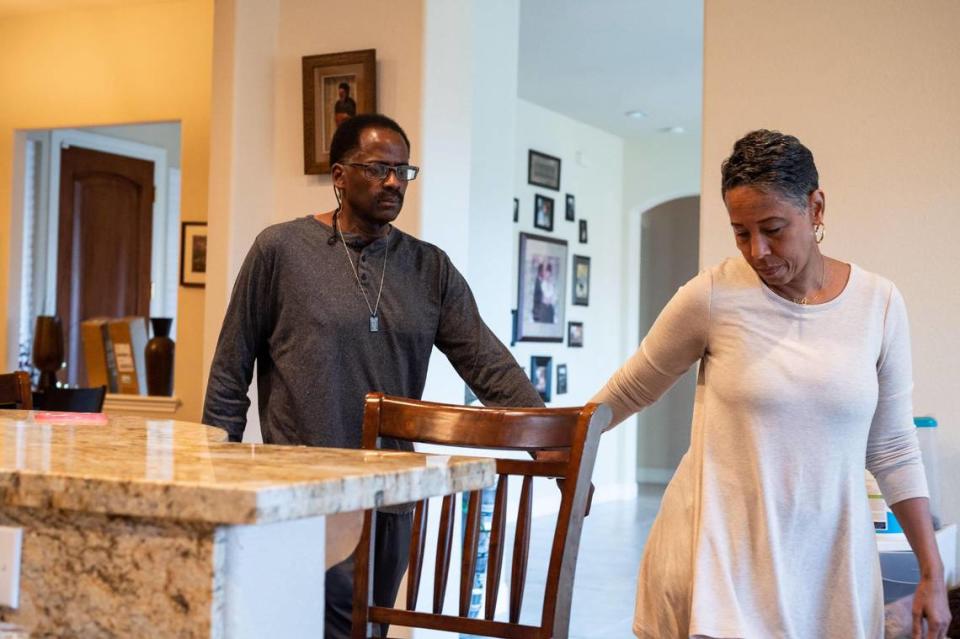An unsung hero in Sacramento fights for her husband and other Black adults battling dementia
Carla Preyer is a different type of hero. Her struggle has been private and personal. She is a reluctant warrior for justice who was forced into advocacy by circumstances beyond her control. She didn’t want this, she dreaded it and cried tears of joy when she was told – wrongly – that she wouldn’t have to face an enemy that frightened her to her soul.
She faces that enemy now every day. Alzheimer’s disease. When that cruel disease enters your home, as it did mine more than a decade ago, you are forced to witness a person you love become someone you don’t recognize.
Preyer didn’t know that Black people were twice as likely as white people to be diagnosed on the Alzheimer’s spectrum until her husband Patrick fundamentally began changing. He began retreating. He went from being a playful, powerful man who didn’t flinch for decades as an operating room nurse to suddenly being reduced to terror attacks when faced by simple tasks such as driving to once familiar locations.
I had a variation of this with my father more than 10 years ago. I saw the seminal male figure in my life become a poor soul who behaved erratically without warning. I know what it’s like to have a complete stranger call me at my place of work and say, “I have your father, please call me.”
And then you call this stranger with your heart in your throat and he tells you that he saw your father driving up and down his street on his electric scooter, looking lost while miles from his home. Have you ever tried to hide tears from your colleagues while you’re sitting in the middle of your office? I did that day, but compared to Preyer, I was lucky. My dad’s condition came at the every end of his life at 89.
Opinion
Patrick Preyer was 58 when Carla Preyer began to notice something was amiss.
“One day, we were reminiscing about his surprise 50th birthday party and how his cousin was in the talent show (that was part of the birthday festivities) as one of the Supremes,” Preyer wrote in a personal remembrance of her journey with Patrick. “As entertaining as she was in the talent show, Patrick didn’t remember his cousin being a part of the party or that she stayed in our home that week. He didn’t even remember her at all. “

She said her outgoing husband suddenly drew inward. He suddenly became suspicious of everyone. A man who loved to putter in the large backyard with the lap pool suddenly began to simply “vegetate” in front of the TV.
“We kept taking him for tests and the tests were inconclusive,” Preyer said. She was told he had stress. Her husband became a candidate for anger management sessions. She was told at one point that he didn’t have dementia and cried tears of joy from relief.
But he didn’t get better. Her tears of joy were replaced by the anxiety of not knowing what was wrong. She had four years of that before she took her husband to the Bay Area, to Stanford Hospital, where the diagnosis finally came: Lewy body dementia.
It’s the condition Robin Williams lived with in his final days. The Mayo Clinic describes it this way: “Lewy body dementia ... is the second most common type of progressive dementia after Alzheimer’s disease dementia.”
“People with Lewy body dementia may experience visual hallucinations and changes in alertness and attention. Other effects include Parkinson’s disease-like signs and symptoms such as rigid muscles, slow movement and tremors.”
Alzheimer’s and Black adults
This is when Preyer discovered another grim fact related to Black people on the Alzheimer’s spectrum: That they may be more likely to be diagnosed in the later stages of the disease. That was Preyer’s experience with her husband, who would have benefited emotionally and physically from knowing sooner what was happening to him when he was less cognitively and physically impaired.
The later a dementia patient is diagnosed, the more they will be in need of medical care.
Preyer also learned that Black Americans are underrepresented in clinical trials for Alzheimer’s Disease, making up only about 5% of trial participants. This is the case despite being at increased risk.
So she became an advocate for her husband and for Black people facing this wretched disease. She serves as a volunteer legislative advocate in Sacramento for the Alzheimer’s Association. Preyer is a member of an African American Planning Committee for an online Alzheimer’s conference scheduled for April. She’s creating a self-care program for dementia caregivers, a badly needed resource for family members with no training who are suddenly left to care for a loved one after Alzheimer’s robs them of their memories, cognitive skills, physical abilities,
Preyer is part of a network of Black advocates in Northern California who are trying to sound the alarm within the Black community.

On Saturday, the Alzheimer’s Association of Northern California and Northern Nevada was scheduled to present a Zoom forum specifically for Black men and Alzheimer’s.
Karla Fields, an outreach specialist with the Alzheimer’s Association of Northern California and Nevada, said that Black victims of this disease face added dangers beyond simply getting lost, as my dad once did.
“Dementia patients don’t like to be touched or cornered,” Fields said. “We had a volunteer whose husband was arrested because a neighbor called the police (on her husband with dementia).” Fields noted that a reality of life in 2021 is that a confrontation between police and Black men on the Alzheimer’s spectrum can become a life or death situation.
Preyer, who has been married to Patrick for more than 30 years, had to take control of his care to save her life and his. They were once a young couple who met on a blind date where they went ballroom dancing.
“Within 10 months I found myself walking down the aisle, going from Carla Brown to Carla Preyer,” she wrote in her remembrance, which she shared with other Alzheimer’s advocates last year.

She told Alzheimer’s advocates a story that reflected the progression of the disease in her husband. One day, Patrick swore there was a truck rocking back and forth on their backyard fence. Carla Preyer smiled at her husband and asked him if he thought he was having another hallucination.
“I’m not crazy!” Patrick replied.
In the moment, Carla Preyer said she retreated to the bathroom where she could collect herself.
She sat down, buried her head in her hands and said, “This is getting real.”
Their small dog walked into the bathroom, lifting her spirits and she began talking to the dog as dog lovers will sometimes do.
Patrick entered the bathroom, looked at Carla and said, ”You’re in the bathroom talking to the dog and you think I’m crazy?”
She said they both laughed hysterically, “just like we used to.” She found the grace in that moment to soldier on.
She cares for her husband, who is now 65. Carla Preyer is 58. Their love endures, even if he doesn’t talk as much as he used to.
They downsized from a large home to a small one in the Rancho Cordova area.
Preyer has dedicated the rest of her life to him and to making sure the Black community digs in deeper to fight this disease.
For her, it’s been a fight for information, for proper care, for dignity, grace and one more thing.
“Alzheimer’s is no laughing matter,” she said. “But laughing does matter.”

